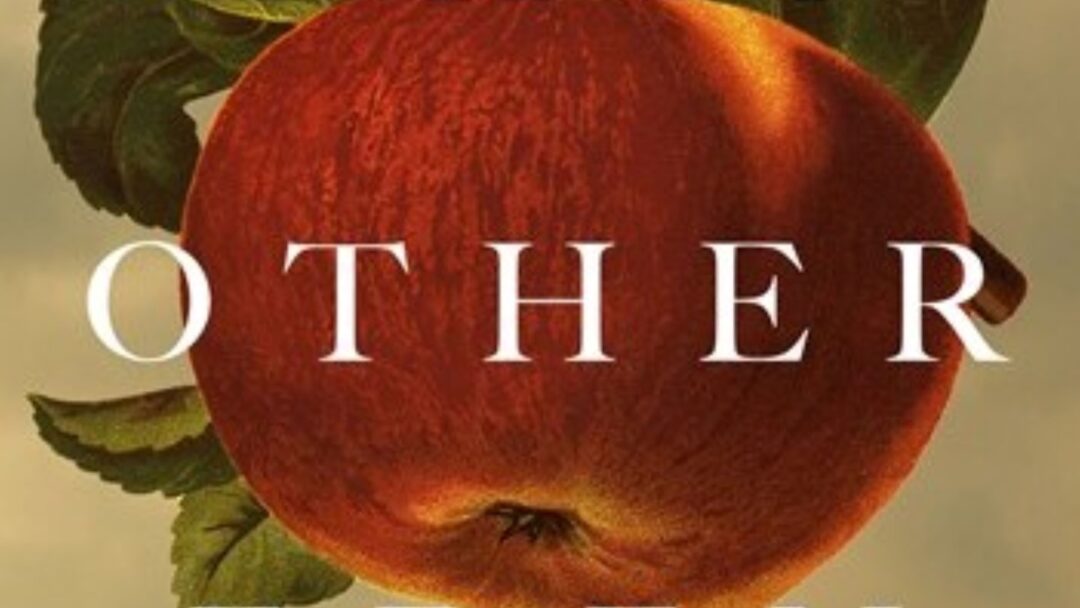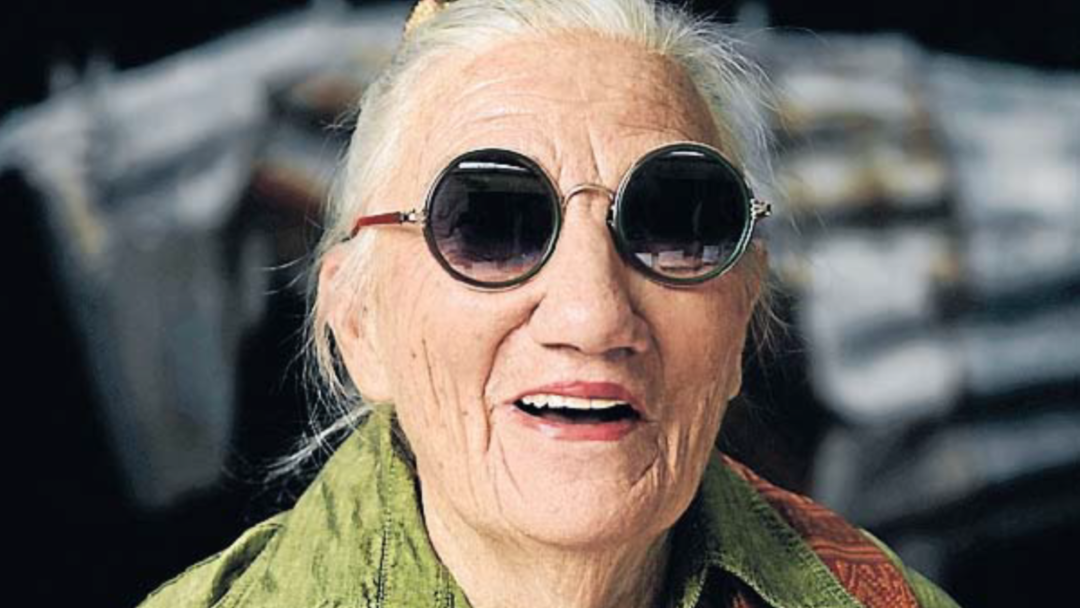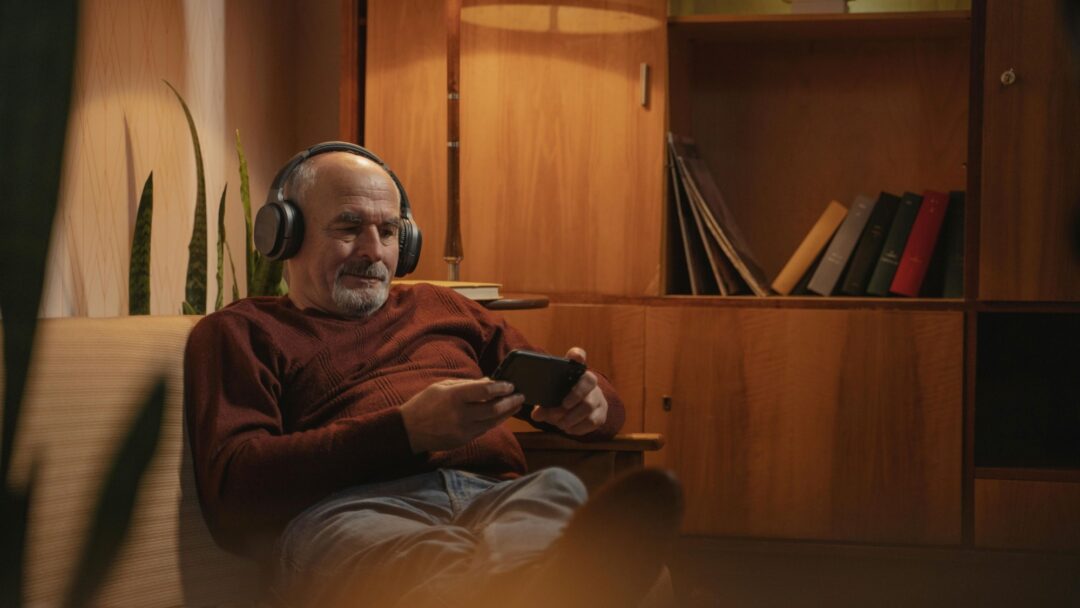Audio
Booker Prize hopefuls
Hear This by
Vision Australia3 seasons
25/8/2023
27 mins
Hear This reviews latest books from Vision Australia library - this edition starting with two Booker Prize aspirants.

Hear This reviews latest books from the Vision Australia library for people who are blind or have low vision. Presented by Frances Keyland.
This edition starts with two books shortlisted for the Booker Prize.
00:09S1
Take. Hello and welcome to you this. I'm Frances Kelland and you're listening to the Vision Australia Library Radio Show, where we talk about books in the Vision Australia library collection. And today we've got a lovely lot of books and samples to go with them. So I do hope you enjoyed today's show. I'll start off today's show with a shout out to Owen, who requested every book from last week's program and the library. Let me know that you did that on. And I remember you well from when I worked here at the library. And it's nice to know that you're still enjoying here this. The books we're starting off with today are two that are on the longlist for the Booker Prize. The first one first one is titled in Ascension and it's by Martin McGuinness. Lee grew up in Rotterdam, drawn to the waterfront as an escape from her unhappy home life and volatile father, enchanted by the undersea world of her childhood. She excels in marine biology, travelling the globe to study ancient organisms. When a trench is discovered in the Atlantic Ocean, Lee joins the exploration team, hoping to find evidence of the Earth's first lifeforms. But what she finds instead calls into question everything we know about our own beginnings. Her discovery leads Lee to the Mojave Desert and an ambitious new space agency drawn deeper into the agency's work. She learns that the Atlantic Trench is only one of several related phenomena from across the world, each piece linking up to suggest a pattern beyond human understanding. Lee knows that to continue working with the agency will mean leaving behind her declining mother and her younger sister. And she faces an impossible choice to remain with her family or to embark on a journey across the breadth of the cosmos. Let's hear a sample of In Ascension by Martin MacInnes. It's narrated by Freya Miller.
02:26S2
I was born in the lowest part of the country, 22ft beneath the sea. When my sister arrived three years later, we moved south into the city proper. Rotterdam's Northern District. The land was newly excavated, freshly claimed from the seafloor, dredged by ships and reinforced by concrete. Parts of the street came loose. The ground underneath still soft. I remember burning incense. A brackish smell indoors, as if every moment were a spell, a scene that had to be called into being. The River Beach was artificial and when we walked over it, I imagined underneath us was a hollow area, a huge chasm. We went there on weekends and on holidays. My father paying careful attention to the tides, never settling in one place, but marching from one direction to another. I poured sand into my plastic bucket, compacted it, upturned it, did it again and again. Don't dig too deep, my father warned before turning his vigilance back to the water. In the Second World War, the centre of Rotterdam, the historic old town, was entirely destroyed.
03:49S1
So that was in Ascension by Martin MacInnes, one of the books on the Booker longlist nominations. And that's. Martin is Martin. Martin McGuinness. Massey. I double knees. Massey. I double knees. That book goes for 13 hours and 40 minutes. And I'm just reading here a little bit of a review from The Guardian by John Self. This review from the 22nd of January 2023. John Self writes My advanced copy of Martin McGuinness new novel States alongside a photograph of dog eared handwritten pages leaning on a rocky outcrop in the sun stacked so roughly they resemble the craggy peaks of a mountain range that in Ascension was written by hand on the coast of East Scotland. And he says this seems less of an affectation than a direct link between the creation of the book and its purpose to reinforce or even reintroduce the importance of connection between people and our planet. In the age of climate crisis. In Ascension, he takes the tropes of science fiction and in five leisurely parts turns them inward. John Self finishes his review with Indeed, it's an apt approach for a book that reminds us to value above all the journey we are on and the world we live in. That was in Ascension by Martin McGuinness, another book nominated for the Booker Prize this year. On the long list is The House of Doors. By turning ten, it is 1921 and at Cassowary House in the Streets settlements of Penang. Robert Hamlin is a well-to-do lawyer and his steely wife, Lesley, a society hostess. Their lives are invigorated. When Willie, an old friend of Robert's, comes to stay, Willie Somerset Maugham is one of the greatest writers of his day, but he is beleaguered by an unhappy marriage, ill health and business interests that have gone badly awry. He is also struggling to write. The more Leslie's friendship with Willie grows, the more clearly she sees him as he is a man who has no choice but to mask his true self. As Willie prepares to leave and face his demons, Lesley confides secrets of her own, including how she came to know the charismatic Dr. Sun Yat sen, a revolutionary fighting to overthrow the imperial dynasty of China. Let's hear a sample of the House of Doors by Twan in ten. It's narrated by Louise Mae Newberry.
06:29S3
During Fontaine, South Africa, 1947. A story like a bird of the mountain can carry a name beyond the clouds, beyond even time itself. Willie. Mom said that to me many years ago. He has not appeared in my thoughts in a long time. But as I gaze at the mountains from my stoop on this autumn morning, I can hear his thin, dry voice, his diction precise. Correct. Like everything else about him. In my memory. I see him again on his last night in our old house on the other side of the world. The two of us on the veranda behind the house, talking quietly. The full moon. A coracle of light adrift above the sea. Everyone else in the house had already retired to bed. When morning came, he sailed from Penang and I never saw him again. 10,000 days and nights have drifted down the endless river since that evening. I live on the shores of a different sea now. A sea of silent stone and sand. Half an hour earlier, I was finishing my breakfast on the stoop when I noticed on the ridge below a familiar figure pedaling up the steep and dusty dirt road. I followed him with my eyes as he came over the rise and coasted down the short poplar lined driveway. Reaching the stoop. He dismounted from his bicycle and propped it against its kickstand. Hubby Moore and Mrs. Hamlin, he called out. Morning, Johan.
08:07S1
That was the House of Doors by Twain in ten three words. Their twin first name, Twan Twan, then ng Eng. Last word to NTN. And that book goes for 11 hours and 15 minutes. And I'm reading from Al Jazeera here and a review by Kate Maybury from the 23rd of May 2023. This is the author's third novel. Kate begins with letting us know that the former Kuala Lumpur lawyer first burst onto the global literary scene with his 2007 debut novel, The Gift of Rain, set in Penang during the Japanese occupation. And he is spurred on with his writing from a passion for history and Malaysia's sometimes painful past, Maybury writes. As with his two previous novels, The House of Doors is immensely evocative of time and place. The rickshaw rider's rib cages hollowed by opium, a sea that is emerald and turquoise and chipped with a million white scratches and the shadows of clouds that bruise the earth. And we do have all of Tuan Tan's novels in the library. So we have the Garden of Evening Mists set in 1949, Malaya and also The Gift of Rain, his 2007 debut novel. Now to a novel that's been likened to knives out or described as knives Out meets the Thursday Murder Club. This is Benjamin Stevenson's. Everyone in my family has Killed someone. Ernie Cunningham, a teacher and crime fiction aficionado, is a reluctant guest at a family reunion held in a snowbound mountain retreat three years ago. Ern witnessed his brother Michael kill a man and immediately shopped him to the police. This was a betrayal. No one in his well known crime family could forgive. And for the last few years, Ernie has been shunned by his relatives. But now they are all gathered at the Sky Lodge Mountain Retreat to welcome Michael back into the fold after his release from prison. However, on the eve of Michael's release, the body of a man is found frozen on the slopes. While most assume the man simply collapsed and died of hypothermia. During the night, Ern and his stepsister, Sophia, spot a strange detail. The man's airways are clogged with ash. He appears to have died by fire in a pristine snowfield without a single burn mark on him with the local police officer. PC Darius Crawford, soon overwhelmed by the death of the man no one can identify, Ernie begins his own investigation. Let's hear a sample of Everyone in My Family Has Killed Someone by Benjamin Stevenson. It's narrated by Robert DeGraw.
10:59S4
A single beam of light rotating through the curtains told me my brother had just pulled into my driveway. When I walked outside, the first thing I noticed was that Michael's left headlight was out. The second was the blood. The moon had gone. The sun yet to rise. But even in the dark, I knew exactly what the dark spots were. Flicked on a shattered headlight and smeared alongside a hefty dent in the wheel arch. I'm not normally a night owl, but Michael had called me half an hour before. It was one of those phone calls that, as you blearily read the time, you know, is not to tell you about winning the lottery. I have a few friends who occasionally call me from their Uber home with a roaring tale of a good night out. Michael is not one of them. That's a lie, actually. I wouldn't be friends with people who called after midnight. I need to see you now. He was breathing heavily. No call from a payphone or a bar. I spent the next half hour shivering, even in a heavy jacket, wiping circles in the condensation on my front window to better see his approach. I'd given up sentry duty and retired to the couch when his headlight flicked the back of my eyelids. Red. I heard a growl as he brought the car to a stop, then killed the engine, but not the electrics. I opened my eyes, savored the ceiling for a moment, as if I knew that once I stood up, my life would change.
12:22S1
That was everyone in my family has killed someone. By Benjamin Stephenson. Benjamin is Benjamin. Benjamin Stephenson is Steve. Ian Sohn Steve. Ian Sohn. And that book goes for nine hours and reading here from The Guardian, there's a review by BJ Silk and this was from April 2022. He writes that Stephenson's new novel was inspired by a back to front tactic. I thought, What if I spoiled the entire book on the first page? Can I build a crime novel out of it? And the result is everyone in my family has killed someone. An exorbitantly hyped whodunit where the grand riddle is the body count and a quote from the book. Everyone in my family has killed someone. Some of us, the high achievers have killed more than once. Silcox goes on to write the Darcy clan in question. Is the Cunningham family a grand collision of tropes? There's an uptight aunt, a quiet addict, a Rolex wielding lawyer, an imperious matriarch, and the narrator of the book is the affably gormless one earnest. The Washington Post. And this is Maureen Corrigan from February 15th, 2023, writes If everyone in my family has killed someone weren't so sly, it would be insufferable. It's a show off of a novel flaunting its erudite mastery of the conventions of golden age. British mystery fiction in every twist turn and red herring of its plot. She finishes her review within. Everyone in my family has killed someone. Stephenson not only plays fair, he plays the mystery game very, very well. That was everyone in my Family Has Killed Someone by Benjamin Stephenson. Now let's stay on the theme of the golden era of detective fiction, or at least the cozy mystery type books. This book is the Riviera Express. It's part one in the Miss Diamant mystery series by T.P. Fielden. Gerald Hennessy, a silver screen star and much loved heartthrob, never quite makes it to Temple Regis, the quaint seaside town on the English Riviera, murdered on the 430 from Paddington. The loss of this great man throws Temple Regis community into disarray, not least Miss Judy Dumont, corkscrew haired reporter for the local rag, the Riviera Express, investigating Gerald's death. She soon called the scene of a second murder and setting off on her trusty moped, Herbert. She finds Arthur shrimp in an apparent suicide on the tree clifftops above the town beach. Ms.. Dumont must prevail for why was a man like Gerald coming to Temple Regis anyway? And what is the connection between him and Raymond? And just how will she get any answers? Whilst under the watchful and mocking eyes of her infamously cantankerous editor Rudyard Rees, let's hear a sample of the Riviera Express by T.P. Fielden. It's narrated by Eve Karpf. When Miss Dimond smiled, which.
15:32S3
She did a.
15:32S1
Lot, she was beautiful. There was something mystical about the arrangement of her face.
15:38S5
Furniture, the grey eyes, the broad forehead, the thin lips wide spread. Her dainty, perfect teeth. In that smile was a joie de vivre, which encouraged people to believe that good must be just around the corner. But there were two faces to Ms.. Dement when hunched over her typewriter, rattling out the latest episode of Life in Temple Regis. She seemed not so sunny. Her corkscrew hair fell out of its makeshift pinions. Her glasses slipped down the convex nose. Those self-same lips pinched themselves into a tight little knot and a general air of mild chaos and discontent emanated like puffs of smoke from her desk. Life on the Riviera Express was no party. The newspaper's offices, situated at the bottom of the hill next door to the brewery, maintained their dreary pre-war combination of uprightness and formality. The front hall, the only area of access permitted to townsfolk, spoke with its oak panelling and heavy desks of decorum, gentility, continuity.
16:47S1
That was the Riviera Express by T.P. Fielden. So first is the initials T and then P last name Fielden. If I e. L. D e. N f i. E l d e. In that book goes for nine hours, Part one of the Diamant Series mystery series. T.P. Fielden is a novel writer and broadcaster. He's he's cosy Crimes are set on the Devonshire Coast in the late 1950s, and we have four of the books in this series. Part two is Resort to Murder. Sounds like a delightful read in the cozy mystery tradition. Now to some non fiction with the autobiography or memoir blessed by John Doyle, who is rampaging. Roy Slavin, an Australian icon, a raconteur, an athlete of unsurpassable and some may say improbable sporting feats, whether it was riding routine King to another Melbourne Cup victory, commentating the Olympics or hobnobbing with the country's upper crust rampaging Roy Slavin has lived an extraordinary life. But even some of the greatest men come from humble beginnings. Before he shot to fame as Australia's most talented sportsman, he was just another kid in Lithgow, trying to avoid Brother Connell's strap and garner the attention of Susan Morgan from the local Catholic girls school. Blissett follows one year in the life of the boy who would become rampaging Roy Slaven, a boy who even at the age of 15, knew he was destined for greatness but had to get through high school first. Let's hear a sample of Blessed by John Doyle. It's narrated by John Doyle.
18:35S6
Let's go in summer often like to surprise with a freezing day. Mercifully, Dean and Doyle had got to school early enough to get the fire going in the classroom. Brother Connell appeared to be looking carefully at the details of the large sash window. He didn't appear to be interested in what view the window revealed. He hummed quietly, a tuneless hum. Otherwise, the third form classroom was silent. He then drew a deep breath and hummed one long note. He stopped when he was read in the face, turned and shouted. Time Dean and Doyle put their hands up. Dean. Dean stood 52 seconds. Brother Doyle. Doyle stood 53 seconds. Brother. Correct. We see eye to eye with time, do we not, Doyle? We do, brother. Dean and Doyle sat down on your feet, Slaven. I stood. Brother Connor returned to his interest in the window frame. The window was in good order. Closed mercifully, the temperature outside being three degrees Celsius, 38°F. And Dean knew it in Kelvin and it was windy. The wind came up through the floorboards of the classroom. The classroom was part of the original sandstone structure built in 1890s. An Anglican boarding school. On one side of the room was a fireplace. The old desks beside it referred to as the tropics. On the other side of the room was the tundra. The fire was lit and tended to by the more responsible fellows Dean Doyle and O'Brien, regular members of the tropics Crawlers.
20:12S1
Basically that was blessed by John Doyle. John is j o n j o n surname Doyle. D o y l e. D o y l e. And that book goes for 6.5 hours. And just a bit of a warning there. It does contain very strong language that may offend some. John Patrick Doyle was born, as the book says, in Lithgow in 1953. He became a member of the Order of Australia in 2010 for service to the media as a presenter and entertainer and as a supporter of a range of charitable organisations, particularly the United Nations Children's Fund in Australia. Now to a bit of a more serious sound book. This is also non-fiction, the Dressmakers of Auschwitz by Lucy Adlington. At the height of the Holocaust, 25 young inmates of the infamous Auschwitz-Birkenau concentration camp, mainly Jewish women and girls, were selected to design a cut. And so beautiful fashions for elite Nazi women in a dedicated salon. It was work that they hoped would spare them from the gas chambers. This fashion workshop called the Upper Tailoring Studio, was established by Hedwig Hoss, the camp commandant's wife, and patronized by the wives of SS guards and officers. Here, the dressmakers produced high quality garments for SS social functions in Auschwitz and for ladies from Nazi Berlin's upper crust, drawing on diverse sources, including interviews with the last surviving seamstress, the dressmakers of Auschwitz follows the fates of these brave women. Their bonds of family and friendship not only helped them endure persecution, but also to play their part in camp resistance, weaving the dressmakers remarkable experiences within the context of Nazi policies for plunder and exploitation. Historian Lucy Adlington exposes the greed, cruelty and hypocrisy of the Third Reich and offers a fresh look at a little, little known chapter of World War Two and the Holocaust. Let's hear a sample of the dressmakers of Auschwitz by Lucy Adlington. It's narrated by the author Lucy Adlington.
22:27S7
After two years, I came to the Auschwitz headquarters building, where I worked as a seamstress in the sewing room for SS families. I worked 10 to 12 hours a day. I am one of the few who survived the hell of Auschwitz. Olga Kovac. A day like any other. By the light of two windows. A group of women in white headscarves sat sewing at long wooden tables. Heads bent over garments, needles in, needles out. It was a basement room. The sky beyond the windows did not represent freedom. This was their refuge. They were surrounded by all the paraphernalia of a thriving fashion salon, all the tools of their trade. On the tables, coiling tape measures, scissors and bobbins of thread stacked nearby. Bolts of every kind of fabric scattered around fashion magazines and the crisp tissue of dressmaking patterns. Next to the main workshop was a private fitting room for clients, all under the aegis of clever, capable martyr who not long since had run her own successful salon in Bratislava.
23:47S1
And that was a sample of the dressmakers of Auschwitz by Lucy Adlington. Lucy is Lucy. Lucy Adlington is a d. L. I. N g t o n a d. L. I. N g t o n. And that book goes for 12 hours. A little bit about Lucy Adlington. She's an author, presenter and keen collector of vintage and antique costumes, and she writes both history inspired fiction and fascinating social history books. She lives in the north of England with a patient farmer and a cat the size of a small armchair. This is from Lucy Adlington website. So simply Lucy Adlington The dressmakers of Auschwitz, The true story of the women who Sewed to Survive has been translated into 22 languages and listed on the New York Times best seller list. This book was published in 2021, and it was after Adlington published a fictional account in 2017 called The Red Ribbon. Descendants of some of the dressmakers contacted her with more information about the women who had worked in the camp. That's all we have time for, for today. I'm Frances Kelland and you're listening to hear this. If you are listening and you're not a member of the library, you may be listening to this program in the car or at home or wherever you are, and you would like to join the library or find out more about how to join for yourself or for somebody else. Give the library a call on 1300 654 656. That's 1300 654 656. Or you can email library at Vision Australia. Org. That's a library at Vision Australia. Org. This is a free library service for anybody who has print disability and this can include blindness and low vision. It can also be due to motor neuron conditions that make it hard to hold. Book or turn pages can be about dyslexia, so please don't ever hesitate. And the library staff are wonderful at explaining how the library works. It's important for the library. It's important for people with low vision, the community that people who are eligible to join and want to join do so. The more people that use the library service, the more this essential service can grow. And also, of course, a feedback is always welcome to the library or the radio station and you can send that through as an email or you can ring up book recommendations. Always, always welcome. I'd love to hear about books or even if you want to hear about a particular theme, you know, you want to know more about what's available in the library, about a favourite topic that you might be interested in. The library can do a search for you, or they can help you help guide you through doing the search online. And as Leanne CJD, our community engagement coordinator, has said, our library community shape the library. So if there's a book that you think you would like to suggest that the library get again email or call the library and just ask if that book can be put into Braille audio, whatever format you want. The library grows and is shaped by the library community. So become a member and suggest books and give feedback. It's always very valuable and that's enough for me today. I hope you all have a lovely week and we'll be back next week with more here this.
Continue listening

On Hear This, latest books in the Vision Australia library. This edition, award-winning Oz fiction.
Australian fiction
Hear This by Vision Australia
4/8/2023
•28 mins
Audio

Books from the Vision Australia library - this episode featuring memoirs and family histories.
Family histories
Hear This by Vision Australia
11/8/2023
•27 mins
Audio

This edition: Michael Parkinson remembered and an assortment of latest books from the Vision Australia library.
Vale Michael Parkinson
Hear This by Vision Australia
18/8/2023
•26 mins
Audio

Hear This reviews latest books from Vision Australia library - this edition starting with two Booker Prize aspirants.
Booker Prize hopefuls
Hear This by Vision Australia
25/8/2023
•27 mins
Audio

Hear This interviews Tracey Chevalier, author of Girl with a Pearl Earring.
Girl with a Pearl Earring
Hear This by Vision Australia
8/9/2023
•28 mins
Audio

Hear This samples a variety of audio books from the Vision Australia library.
Top picks from audio books
Hear This by Vision Australia
15/9/2023
•28 mins
Audio

Events and activities at Vision Australia library - and latest picks from its books.
Community engagement
Hear This by Vision Australia
22/9/2023
•27 mins
Audio

This edition of Hear This from the Vision Australia library opens with a discussion of banned books.
Banned books
Hear This by Vision Australia
6/10/2023
•28 mins
Audio

Hear This features latest books and events at the Vision Australia library.
Latest events and books
Hear This by Vision Australia
13/10/2023
•27 mins
Audio

Latest books from the Vision Australia library - including childhood tales and a John Grisham thriller.
Childhood tales and a Grisham thriller
Hear This by Vision Australia
20/10/2023
•28 mins
Audio

Latest books from the Vision Australia library - including a novel by Australian Sam Drummond.
Oz writer Sam Drummond
Hear This by Vision Australia
3/11/2023
•27 mins
Audio

Books from the Vision Australia library - including a memoir by a friend of Anne Frank.
Anne Frank's friend
Hear This by Vision Australia
10/11/2023
•28 mins
Audio

Book reviews and excerpts from Vision Australia library - including a wartime struggle for survival.
Survival in wartime
Hear This by Vision Australia
24 November 2023
•27 mins
Audio

A special seasonal edition reviews Christmas murder stories available from Vision Australia library.
Yuletide Homicide
Hear This by Vision Australia
8 December 2023
•28 mins
Audio

Veteran talking book reader Tony Porter reviews his many voices.
The many voices of Tony Porter
Hear This by Vision Australia
5 January 2024
•27 mins
Audio

What's new in Vision Australia library of Braille and audio books - including new Australian works.
New Australian books
Hear This by Vision Australia
12 January 2024
•28 mins
Audio

Vision Australia librarian talks of coming events and latest books for people with blindness and low vision.
Coming events and new books
Hear This by Vision Australia
26 January 2024
•28 mins
Audio

Review of books from the Vision Australia library - from a broad international range.
Books from Japan, US, Australia and Sweden
Hear This by Vision Australia
2 February 2024
•27 mins
Audio

New books in the Vision Australia library - from E.L.Doctorow to Alan Bennett.
Reasons Not to Worry, Wild Things... and Alan Bennett
Hear This by Vision Australia
9 February 2024
•28 mins
Audio

Latest events and books from Vision Australia Library, featuring its Community Engagement Co-ordinator.
Vision Library latest with Leeanne
Hear This by Vision Australia
16 February 2024
•28 mins
Audio

Features Jamie Kelly of Vision Australia Library, updating us on its website catalogue. And other new books.
Vision Australia library online, and Jelena Dokic
Hear This by Vision Australia
23 February 2024
•29 mins
Audio

New books in the Vision Australia Library - in this edition, books about paintings.
Books about paintings
Hear This by Vision Australia
1 March 2024
•26 mins
Audio

From the Vision Australia Library, women's memoirs on International Women's Day.
Women's memoirs on IWD
Hear This by Vision Australia
8 March 2024
•28 mins
Audio

Coming events and books at Vision Australia Library for people with blindness or low vision.
Coming events at Vision Library - and a Kerouac classic
Hear This by Vision Australia
15 March 2024
•29 mins
Audio

Latest books from Vision Australia Library - this week, some top Oz and worldwide novels.
Top Oz and world novels
Hear This by Vision Australia
29 March 2024
Audio

Coming events at Vision Australia Library in connection with the Melbourne Writers' Festival.
Melbourne Writers' Festival
Hear This by Vision Australia
5 April 2024
•28 mins
Audio

Coming events and new books at the Vision Australia Library for blind and low vision people.
Event update and more new books
Hear This by Vision Australia
12 April 2024
•29 mins
Audio

How printed works are brought to life as audio books in the Vision Australia Library.
Audio book narrators
Hear This by Vision Australia
19 April 2024
•28 mins
Audio

ANZAC Day edition of this series from the Vision Australia library for people with blindness or low vision.
ANZAC sniper
Hear This by Vision Australia
26 April 2024
•28 mins
Audio

From the Vision Australia library: a South African childhood, AI issues and an American First Lady.
Apartheid, AI and Michelle Obama
Hear This by Vision Australia
3 May 2024
•27 mins
Audio

Forthcoming Vision Library events including those connected with the Melbourne Writers' Festival.
Melbourne Writers' Festival and Vision Library events
Hear This by Vision Australia
10 May 2024
•28 mins
Audio

Murder mystery novels available from the Vision Australia library are reviewed and sampled.
Murder mysteries
Hear This by Vision Australia
24 May 2024
•27 mins
Audio

Celebrating National Reconciliation Week with books from Vision Australia Library... plus some user favourites.
Reconciliation Week and Reader Recommends
Hear This by Vision Australia
31 May 2024
•27 mins
Audio

Reader Recommends and crime fiction from the Vision Australia library for blind and low vision people.
This Other Eden... and some other readin'!
Hear This by Vision Australia
7 June 2024
•29 mins
Audio

Vision Library's coming community events and latest books for people with blindness or low vision.
Coming events and latest books
Hear This by Vision Australia
14 June 2024
•29 mins
Audio

Books in Vision Australia library for people with impaired vision - this time on the theme of Darkness.
Darkness
Hear This by Vision Australia
21 June 2024
•29 mins
Audio

New books in Vision Library including the Wikileaks founder's autobiography.
Julian Assange - by the man himself
Hear This by Vision Australia
28 June 2024
•29 mins
Audio

Community events soon to happen at Vision Australia Library for people with blindness and low vision.
Coming events at Vision Australia Library
Hear This by Vision Australia
5 July 2024
•28 mins
Audio

Two well-known authors open the latest look at new publications in the Vision Australia Library.
Hilary Mantel, Bret Easton Ellis and more
Hear This by Vision Australia
19 July 2024
•27 mins
Audio

Vision Library series, this episode features new Australian crime novels written by women.
Australian sisters in crime
Hear This by Vision Australia
26 July 2024
•28 mins
Audio

Latest publications in the Vision Library, starting with a biography of John Farnham.
He's the Voice
Hear This by Vision Australia
2 August 2024
•27 mins
Audio

Latest reviews and readings from publications in the Vision Library for people with print disabilities.
Race, history and Black Ducks
Hear This by Vision Australia
9 August
•28 mins
Audio

Books from Vision Library reviewed include a Julie Andrews memoir, Guardian newspaper picks and more.
Julie remembers and The Guardian recommends
Hear This by Vision Australia
30 August 2024
•27 mins
Audio

An Australian author discusses her works, plus reviews of other books in the Vision Library.
Jane Rawson - author
Hear This by Vision Australia
6 September 2024
•28 mins
Audio

Update on forthcoming events and available publications at the Vision Australia Library.
What's On at Vision Australia Library
Hear This by Vision Australia
13 September 2024
•27 mins
Audio

Accessible Vision Library books reviewed, including murder mysteries and award nominees.
Mysteries and prize contenders
Hear This by Vision Australia
20 September
•27 mins
Audio

Reviews and events at Vision Australia Library to mark World Sight Day, October 10.
World Sight Day and Barbra Streisand
Hear This by Vision Australia
4 October 2024
•28 mins
Audio

What's on in the Vision Library, and the works of Ira Levin and Han Kang.
Library events, Ira Levin and Han Kang
Hear This by Vision Australia
11 October 2024
•28 mins
Audio

Vision Library publications reviewed - opening with some tributes to writers passed.
Tributes, and more
Hear This by Vision Australia
18 October 2024
•28 mins
Audio

Reviews and readings from Australian, British and US books in the Vision Australia Library.
Tomorrow, Questions, Mistresses and Murder
Hear This by Vision Australia
25 October 2024
•28 mins
Audio

Reviews and readings from books available in the Vision Australia Library.
From Australian thrillers to the US and South Africa
Hear This by Vision Australia
1 November 2024
•28 mins
Audio

A wide range of books in the Vision Australia Library are reviewed and sampled.
Leonard Cohen, ghosts and Broken Hill
Hear This by Vision Australia
8 November 2024
•28 mins
Audio

Events and publications at Vision Australia Library for people with blindness or low vision.
Vision Library: what's in and what's on
Hear This by Vision Australia
15 November 2024
•28 mins
Audio

Interview with an award-winning author about her life and work... plus more publications in the Vision Australia Library.
Jacqueline Bublitz
Hear This by Vision Australia
22 November 2024
•28 mins
Audio

Vision Australia Library for people with vision impairment updates its coming events and latest publications.
Coming soon to the Vision Library
Hear This by Vision Australia
13 December 2024
•28 mins
Audio

Christmas-themed books in the Vision Australia Library for people with vision impairment.
Christmas offerings
Hear This by Vision Australia
20 December 2024
•28 mins
Audio

New books for 2025, fiction and non-fiction - vale Leunig!
Fiction and non-fiction for the New Year
Hear This by Vision Australia
3 January 2025
•27 mins
Audio

Reviews of varied books from the Vision Library - some centring on radio stations or radio plays.
Radio drama
Hear This by Vision Australia
10 January 2025
•29 mins
Audio

What's On at Vision Australia Library - and latest publications accessible to people with blindness and low vision.
Coming events in 2025 - and latest publications
Hear This by Vision Australia
24 January 2025
•28 mins
Audio

Writings on Marianne Faithfull and award-contending works in the Vision Australia Library are reviewed.
Vale Marianne... and award-nominated books
Hear This by Vision Australia
31 January 2025
•28 mins
Audio

Special guest highlights interesting events in libraries around the country... and some new books.
What's new in libraries around Australia
Hear This by Vision Australia
7 February 2025
•27 mins
Audio

Accessible publications chosen for February 14: Library Lovers' Day, Valentines Day and World Radio Day.
Library Lovers' Day
Hear This by Vision Australia
14 February 2025
•29 mins
Audio

An update on Vision Australia Library's coming events and latest blind-accessible books.
Coming events and new books
Hear This by Vision Australia
25 February 2025
•29 mins
Audio

Reviews of accessible books including a John Steinbeck classic, and news of a forthcoming writers' festival.
Brimbank and Steinbeck
Hear This by Vision Australia
28 February 2025
•29 mins
Audio

Coming courses and other events at Vision Australia Library - and latest accessible books.
Courses, events and latest publications
Hear This by Vision Australia
14 March 2025
•28 mins
Audio

Special with interviews and readings at a writers' festival and writing competition in Melbourne.
Brimbank Writers' and Readers' Festival and Micro-fiction Competition
Hear This by Vision Australia
21 March 2025
•30 mins
Audio

An interview with an Australian woman writer and reviewer, about her favourite female authors.
Women authors with Stella Glorie
Hear This by Vision Australia
28 March 2025
•29 mins
Audio

Reviews and excerpts from accessible works in the Vision Australia Library, starting with a new Australian novel.
Reader recommends a Deal
Hear This by Vision Australia
4 April 2025
•27 mins
Audio

Vision Australia Library brings news of accessible events at the forthcoming Melbourne Writers' Festival.
Melbourne Writers' Festival 2025
Hear This by
11 April 2025
Audio

Vision Australia Library pays tribute to the late Australian author of the Miss Fisher mysteries and more.
Vale Kerry Greenwood
Hear This by Vision Australia
18 April 2025
•28 mins
Audio

ANZAC Day special featuring reviews and short readings from books about the First World War.
Reading about World War 1
Hear This by Vision Australia
25 April 2025
•28 mins
Audio

Reviews and readings of user favourites in Vision Library - including an Antarctic adventure.
Reader recommended
Hear This by
2 May 2025
•28 mins
Audio

What's accessible in the Vision Australia Library - including new books by Kate Grenville and Eric Idle.
Always look on the bright side of... time and place
Hear This by Vision Australia
9 May 2025
•29 mins
Audio

First part of an interview with an Australian author, military historian and war veteran.
Barry Heard's true tales of war (part 1)
Hear This by Vision Australia
16 May 2025
•28 mins
Audio